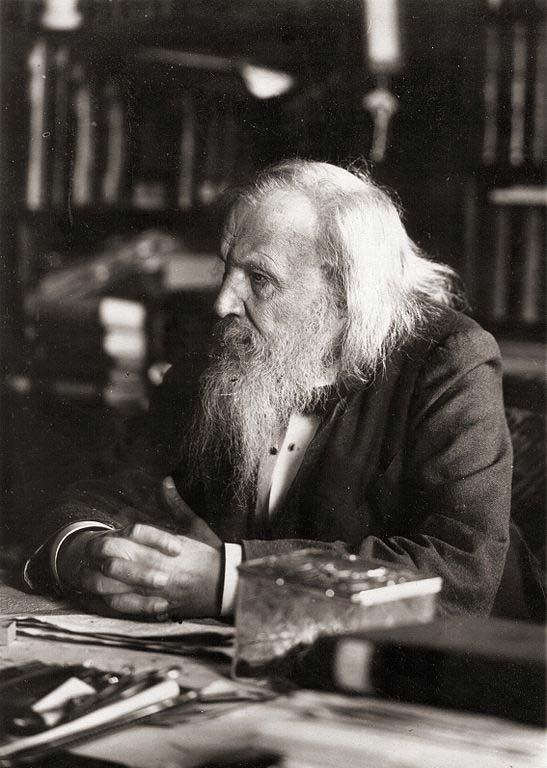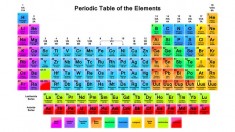| Dmitri Mendeleev | |
|---|---|
 |
|
| Chemist & Inventor | |
| Specialty | Chemistry, physics |
| Born | Feb. 8, 1834 Verkhnie Aremzyani, Russian Empire |
| Died | Feb. 2, 1907 (at age 72) St. Petersburg, Russian Empire |
| Nationality | Russian |
Dmitri Mendeleev was a famous Russian chemist and inventor who formulated Periodic Law and created his own version of the Periodic Table of Elements. He used the table to correct properties of some discovered elements and to predict elements that were yet to be discovered.
Mendeleev’s Early Life
Dmitri was born on February 8, 1834, in a village near Tobolsk in Siberia. His grandfather was a priest of the Orthodox Church from the Tver region. Dmitri with his siblings obtained new family names while attending the theological seminary. Despite growing up as an Orthodox Christian, Mendeleev later rejected this religion and embraced a form of deism.
Dmitri’s father was a teacher of fine arts, philosophy, and politics. However, he later turned blind and lost this job. His wife was therefore forced to go out and look for a job. Dmitri’s mother restarted the family’s abandoned glass factory. When Dmitri was 13 years old, his father passed away and their factory was totally destroyed by a fire accident.
Educational Years
In 1849, Dmitri’s mother took him across Russia, Siberia, and Moscow. She did all this with an aim of looking for a higher education for her son. The now very poor family decided to relocate to Saint Petersburg. Dmitri attended the Main Pedagogical Institute in 1850.
After his graduation, he contracted tuberculosis in 1855. This forced him to travel to the Crimean Peninsula on the northern coast of the Black Sea. While in this new place, he became a science master of the Simferopol Gymnasium. He returned to Saint Petersburg in 1857 with a fully restored health.
The Periodic Table

In 1863, Dmitri was appointed to be a professor to succeed the chair of the university. L. A. Tchugayez, a Russian chemist, has described him as chemist genius and a fruitful researcher in the field of meteorology, hydrodynamics, geology, chemical technology and other disciplines of chemistry and physics.
Dmitri Mendeleev’s greatest achievement was the Periodic Table. He always felt that there was some time of order to the elements. He actually spent more than 13 years of his life working on this periodic table. He collected data and assembled the concept with the idea of resolving the disorder in this table.
In 1863, there were only 56 known elements; a new element was discovered at a rate of about one each year. Other scientists had at first identified periodically of elements by noting their periodicity in relative to atomic weight in 1864. This was published in 1865. After Dmitri Mendeleev became a teacher, as he tried to classify the elements according to the chemical properties, he realized some patterns that led him to postulate a periodic table. He developed his own table by adding some additional elements.
Mendeleev published his table of all the known elements and even predicted new elements that would complete the periodic table. For the predicted elements, Dmitri used prefixes of dvi, tri, and eka in their naming. He also questioned some of the accepted atomic weights and also noted that tellurium has a higher weight than iodine. Some people dismissed Dmitri when he predicted more elements, but they were proven wrong when gallium (Ga) and germanium (Ge) were discovered in 1875 and 1886. The two elements fit perfectly into the two missing spaces.
The Mendeleev Legacy
Apart from his work in general chemical concepts, Dmitri Mendeleev spent a lot of time working to improve the technological advances of Russia. Most of his findings dealt with agricultural chemistry, mineral recovery, and oil refining. He is also given credit for the creation of the metric system to Russian Empire.
He was able to invent pyrocollodion, which is a smokeless powder based on nitrocellulose. Dmitri was also one amongst the founding members of the Russian Chemical Society. He helped open a line of communication between scientists in the U.S. and Europe.
Mendeleev also researched the various properties and the behavior of gasses at both high and low pressures. This led to the development of one super accurate differential barometer and further research on meteorology. He also investigated the expansion of liquid with heat and came up with formula similar to Gay-Lussac Law of expansion of gasses.
Later Life
Throughout his life, Dmitri Mendeleev received many awards and honorary degrees from several organizations and institutions around the world. He continued to be a very popular social figure until his death in 1907.